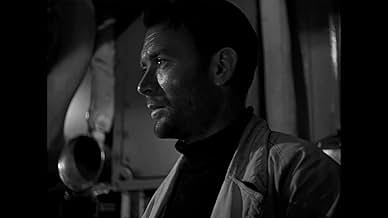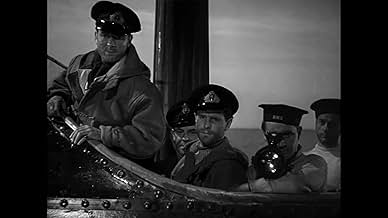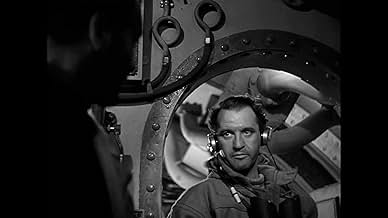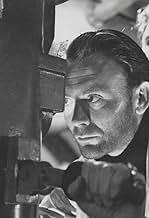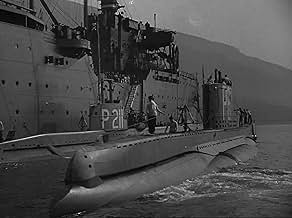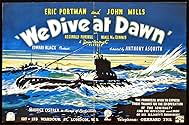IMDb RATING
6.7/10
1.8K
YOUR RATING
All leave is cancelled so that a British submarine can be sent after a new German warship. They chase it so far that they have no fuel to get home.All leave is cancelled so that a British submarine can be sent after a new German warship. They chase it so far that they have no fuel to get home.All leave is cancelled so that a British submarine can be sent after a new German warship. They chase it so far that they have no fuel to get home.
Robert Wilton Jnr
- Cook - 'Pincher'
- (as Robert Wilton)
Marie Ault
- Mrs. Metcalfe
- (uncredited)
Victor Beaumont
- German Airman
- (uncredited)
Frederick Burtwell
- Sidney Briggs
- (uncredited)
Featured reviews
In most US made submarine action movies the process of torpedoing the enemy appears fairly straightforward and painless. Clark Gable, Cary Grant and Tyrone Power never seem to miss. In this movie one gets the sense that it is not so easy to sink an enemy ship at range. In this movie during the battle scene the Coxswain can't seem to keep the boat level in the water, the first officer forgets to read the bearing, someone else seems to be asleep at the switch at a vital moment. This little bit of realisim was appreciated by this viewer.
The best line in the movie is when the cook bites into a dinner sausage prepared for the crew grimmaces and comments "No wonder they stopped dog racing" or words to that effect.
The best line in the movie is when the cook bites into a dinner sausage prepared for the crew grimmaces and comments "No wonder they stopped dog racing" or words to that effect.
Anthony Asquith's wartime action film is surprisingly good, given the constraints under which it was made. The battle sequences are well staged, with stock footage intercut with interior sequences taking place in the submarine. Asquith captures the claustrophobic life of the crew at sea, with each man trying to live as best they can under highly cramped conditions, while remaining loyal to their captain, Lt. Taylor (John Mills). Everyone accepts that death might occur at any time, yet they try their best to extricate themselves from a difficult situation, after trying to torpedo a German battleship, the Brandenburg. WE DIVE AT DAWN is an interesting example of a wartime propaganda film in which every social class is represented, from the upper class officer Lt. Gordon (Jack Watling), to the no-nonsense working class L/S Hobson (Eric Portman), who believes that his wife Alice (Josephine Wilson) has left him for the local fish-and-chip shop owner. Once aboard the submarine, however, social divisions are forgotten: everyone is committed to the cause of destroying the battleship and returning home safely. This message of all people pulling together was one of the most familiar refrains of World War II, both on the home and the battle fronts. In the end the crew succeed in their task, but not without a daring raid on a Danish port in order to purloin some fuel oil, which they achieve in the face of spirited resistance from the Germans. It is chiefly due to Hobson's resourcefulness that the crew succeeds. WE DIVE AT DAWN might seem a little antiquated now, its social attitudes redolent of a bygone age, but it still stands up as an effective piece of wartime propaganda.
Another typical war film starring John Mills. As ever he pulls the stiff upper lipped British officer role off brilliantly. This film is much stronger than the later submarine based film 'Above Us the Waves' also starring Mills probably because this was actually made during the war, when this was a real threat. It's a good story, with dastardly Germans (well, you have to don't you?) and the good old Royal Navy coming up with the goods. Credit must go to John Mills, who must by now know how to command his own submarine/battleship/platoon. He's also learnt how to look believably concerned whilst looking through a periscope. A must see film.
I very much agree with the comment about the verisimilitude of the control room dialogue and action during the torpedo shoot. However, the scenes that really struck me most forcibly as realistic were those in the engine room during the episode where the Baltic A/S net was penetrated. The mechanician operating the electric motor was (in my opinion!) definitely not an actor - he was a matelot doing his regular job, and he was obviously jolly proud of it too. The repetition of these "ahead/astern" scenes suggests that the director was as fascinated as I was. The film is and will remain well worth watching for scenes like these. And for our US friends who find the dialogue difficult - well, I often use the subtitles option when watching modern Hollywood action films, like "Get Shorty". Doesn't stop my enjoyment, and I can then understand about 90% on a second unaided viewing!
Any film about WWII made during WWII by a British production company has no latter-day peer in my opinion, respectfully. The confluence of so many things near and dear to my heart are in At Dawn We Dive: as a descendant of Admiral Horatio Nelson and student of all aspects of World War Two and particularly naval warfare, I favor depictions of subs and action in the North Atlantic and especially those which include the German side of things. For those unacquainted with target priorities, an attack on an enemy warship is the greatest event that a submarine can hope to encounter and such a rare opportunity would develop surprisingly similarly to what we see here. The pacing is deliberate and typical of the works coming out of the Ealing, Rank and British-Gaumont studios back in the day: frankly I prefer its quieter, more cerebral approach for its humanity and realism that engages far better than any over-produced Hollywood movie ever could. This reminds me of Powell and Pressburger's The 49th Parallel thanks to the powerfully persuasive Eric Portman, a favorite of mine. John Mills receives second billing and a smaller font in the titles, so this is clearly meant to be Mr. Portman's film but the whole cast shines. As for the title sequence, am I the only one who is utterly charmed by Gainsborough Production's lovely pre-CGI Gainsborough Girl?
Did you know
- TriviaFilmed in 1942 when British losses in the Battle of the Atlantic reached their peak.
- GoofsEric Portman's character uses the captured German flyer's uniform, including 'flying boots', when going ashore to find fuel, but when the German flyers are first taken they all swim onto the sub barefooted.
- Quotes
Admiral: [Referring to Taylor's womanizing] By the way, wo are you seeing this leave? Your "Aunt Margaret" again?
Lt. Freddie Taylor: [the admral chuckles knowingly and Taylor smiles] I can't risk it, sir. Her husband's on leave.
[They both laugh as they walk in different directions]
- Crazy creditsOpening credits prologue: H. M. S. "Sea Tiger"
- ConnectionsEdited into WW II Theater: We Dive at Dawn (2022)
- How long is We Dive at Dawn?Powered by Alexa
Details
- Release date
- Country of origin
- Languages
- Also known as
- We Dive at Dawn
- Filming locations
- Production companies
- See more company credits at IMDbPro
- Runtime
- 1h 38m(98 min)
- Color
- Aspect ratio
- 1.37 : 1
Contribute to this page
Suggest an edit or add missing content

